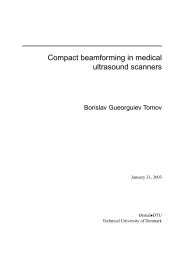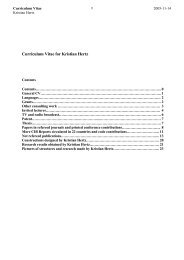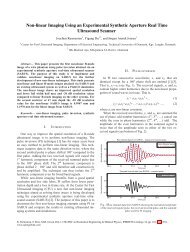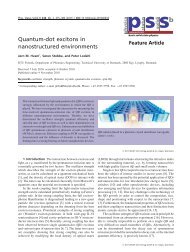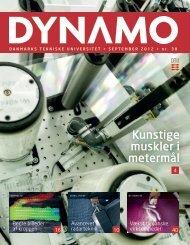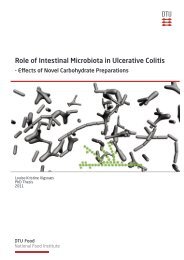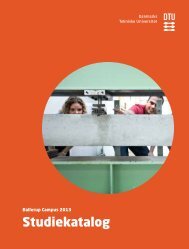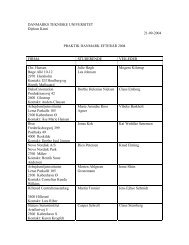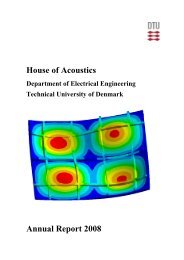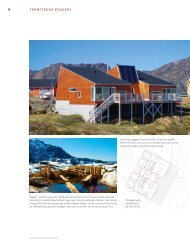MSc programs - DTU
MSc programs - DTU
MSc programs - DTU
Create successful ePaper yourself
Turn your PDF publications into a flip-book with our unique Google optimized e-Paper software.
<strong>MSc</strong> in Polymer Engineering<br />
Semesters: 4<br />
Study credits: 120 ECTS<br />
Start: September 2007<br />
Seats: 60<br />
Application date: March 15 or June 1, 2007<br />
Polymers are materials composed of a large number of smaller molecules, monomers, to<br />
form large molecular structures. Polymers may be classified into synthetic polymers (such<br />
as polyethylene or polystyrene) and biological polymers (such as natural rubber,<br />
polylactides or the protein in spiders’ web). The annual world production of polymers,<br />
currently at 80 million tons, is rapidly growing with polymeric materials continually<br />
replacing traditional materials in countless products (medical, automotive,<br />
telecommunication etc). Also new polymers are synthesized with functionality (chemical,<br />
optical, electrical) not obtainable in traditional materials. At the same time improved<br />
polymer processing operations are developed that convert these polymers to products<br />
with completely new possibilities.<br />
This <strong>MSc</strong> degree covers all aspects of polymer engineering and science including:<br />
Polymer chemistry: Synthesis of polymers with controlled structure as to chain backbone, branching,<br />
cross links and functional units for special optical, electrical, surface or barrier properties.<br />
Polymer technology and physics: Connection between given chemical composition and the mac-<br />
roscopic properties. Compounding and preparation of polymer blends and composites. Polymer<br />
rheology and connection to structure. Multiphase polymeric systems and polymers with nano-size<br />
structures.<br />
Polymer processing: Numerical modeling of injection molding, extrusion, thermoforming and film<br />
blowing.<br />
Career opportunities: The European polymer industry employs well over one and a<br />
half million people and is a major contributor to Europe’s<br />
economic strength. In fact, the wider polymer industry in<br />
Europe accounts for a turnover of €275,000 million (www.apme.<br />
org). The <strong>MSc</strong> will qualify you for a job in the polymer industry or<br />
for a PhD-study.<br />
Prerequisites: BSc in chemical engineering, materials science, chemistry<br />
or similar.<br />
Program Coordinator: Professor Ole Hassager (oh@kt.dtu.dk)<br />
Department: Department of Chemical Engineering (www.kt.dtu.dk)<br />
Read more: http://www.dtu.dk/Centre/DPC/Edu/<strong>MSc</strong>_Polymer_Eng.aspx<br />
<strong>MSc</strong> in Catalysis and Nanotechnology<br />
Semesters: 4<br />
Study credits: 120 ECTS<br />
Start: September 2007<br />
Seats: 60<br />
Application date: March 15 or June 1, 2007<br />
Chemistry and Chemical Engineering<br />
There is an increasing demand for expertise within the area of advanced materials<br />
including catalysts and nanotechnology.<br />
This specialization in Catalysis and Nanotechnology will educate Masters of Science<br />
with competences within synthesis, characterization and application of catalysts for<br />
environmental processes, fine chemicals, energy conversion and fuel cells in addition to chemistry,<br />
biochemistry and catalysis at nanoscale.<br />
Furthermore, the candidates will have the opportunity to be acquainted with theoretical aspects of<br />
catalysis including reaction kinetics and reaction mechanisms.<br />
Theoretical and practical insight in the construction and performance of research<br />
test rigs as well as industrial reaction engineering are also important elements of the education.<br />
The understanding of the relation between structure and properties of the advanced materials and<br />
catalysts is essential for the specialization. Therefore the candidates will be acquainted with methods<br />
of investigation regarding surface studies in addition to spectroscopic and x-ray characterization<br />
of molecular species and structures of solids.<br />
The education will thus appear as multidisciplinary making the candidate able to communicate with<br />
colleagues with very different scientific background.<br />
Career opportunities: The candidates may typically find jobs within research and<br />
development or process engineering in chemical industries<br />
dealing with energy production, environmental<br />
processes advanced materials, catalyst use and catalyst<br />
production.<br />
Prerequisites: BSc degree in Chemistry, Chemical Engineering or equiva-<br />
lent. Students with BSc in Biotechnology or others may<br />
apply if they fulfill the prerequisites necessary to access<br />
the <strong>MSc</strong> program Advanced and Applied Chemistry .<br />
Program Coordinator: Associate Professor Rasmus Fehrmann (rf@kemi.dtu.dk)<br />
Department: Department of Chemistry (www.kemi.dtu.dk)<br />
Department of Chemical Engineering (www.kt.dtu.dk)<br />
Read more: www.kemi.dtu.dk<br />
19



